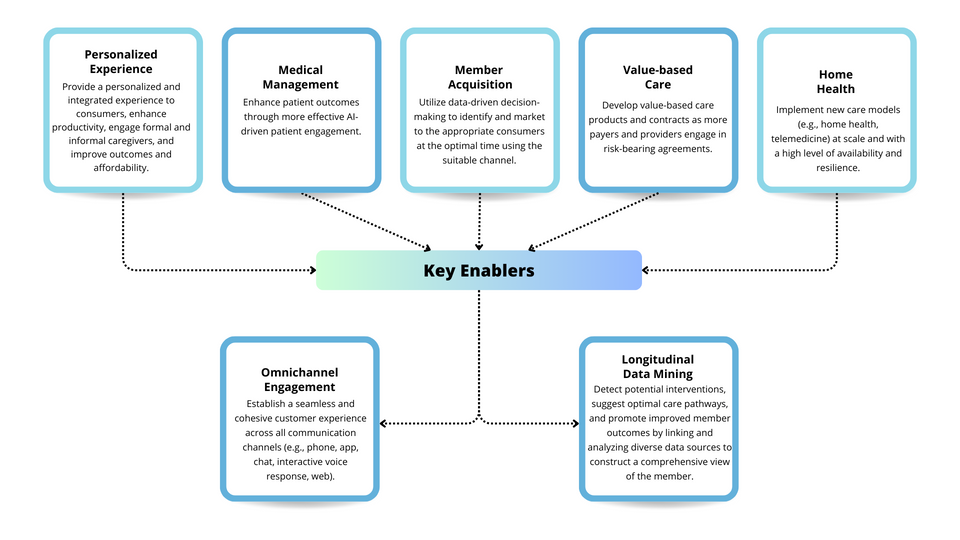Digital transformation and productivity in the healthcare sector (Guest blog from PLANEKS)
Author: Iryna Mahalias, Co-Founder & CEO, PLANEKS
The insights from Mordor Intelligence project the Healthcare Cloud Computing Market to reach $49.14 billion by 2024, with forecasts of $83.93 billion by 2029, reflecting a CAGR of 11.30% from 2024 to 2029. Key drivers include increased access to advanced technologies like ML and AI, widespread adoption of IT in healthcare, and cloud services' role in reducing costs while enhancing scalability, efficiency, and flexibility. This shift is revolutionizing healthcare operations, service delivery, and patient outcomes.
In this post, you’ll explore how cloud-enabled digital transformation boosts efficiency and productivity and the critical importance of cloud-native technologies and application modernization in healthcare.
Understanding Cloud-Enabled Digital Transformation
In a nutshell, digital transformation implies adopting digital technologies into all business performance elements, primarily modifying how organizations set their workflows and deliver value to customers. Cloud computing stands at the core of this process, offering scalable, flexible, and cost-effective capacities for storing, processing, and accessing data. When it comes to the healthcare industry, the adoption of cloud-enabled technologies helps optimize procedures, elevate collaboration within the clinic, and satisfy patients with highly personalized care. Due to this fact, the report published by Philips claims that in June 2022, 66% of healthcare market giants prepare to transmit their technology infrastructures to the cloud in 2022, which is predicted to grow to 96% by 2024.
Enhancing Efficiency and Productivity in Healthcare
The healthcare domain struggles with industry-specific challenges in terms of efficiency and productivity, covering complex regulatory requirements, interoperability issues, and operating costs that are going through the ceiling. Cloud-powered digital transformation accurately caters to these obstacles by equipping healthcare vendors with the tools and infrastructure required to enhance efficiency and productivity. Put in practice, cloud-based telemedicine platforms facilitate seamless remote consultations, eliminating the need for in-person appointments and delivering access to care for clients in distant areas.

Source: McKinsey.com
Leveraging Cloud-Native Technologies
Cloud-native technologies, such as microservices architecture, containers, and serverless computing, offer healthcare providers robust innovation and flexibility. These solutions enable accelerated development flow, continuous integration/continuous deployment (CI/CD), and smooth scalability so organizations can effectively adapt to the dynamic market facilities and deliver new services, achieving a higher efficiency. Furthermore, cloud-native approaches boost interoperability and data sharing across diverse healthcare systems, resulting in improved coordination of care and more positive patient outcomes.
Application Modernization in Healthcare
Legacy systems and obsolete technology infrastructure are ordinary restrictions hindering innovation and efficiency in the healthcare domain. Application modernization, which comprises upgrading and optimizing legacy applications for the cloud, allows obtaining the across-the-board power of cloud-based digital transformation. By keeping applications up-to-date, healthcare organizations make tangible progress in their system performance, solidify data security, and bring seamless integration with other cloud-based services. For example, moving electronic health records (EHR) to the cloud allows real-time access to patient information, providing accurate clinical decision-making and flawless patient interactions.
Driving Efficient Products and Services
Cloud-based digital transformation and application modernization enable healthcare establishments to offer patients and providers more powerful products and services. Cloud-based software delivers real-time data access, a more individual approach to patient care, and predictive analytics, resulting in enhanced clinical outcomes and higher patient satisfaction rates.
Moreover, artificial intelligence (AI) and machine learning (ML) technologies powered by the cloud allow healthcare vendors to analyze large datasets, determine trends, and make data-driven decisions that positively impact efficiency and productivity. Based on a global Statista survey conducted in 2022, 44% of respondents expressed their willingness to place trust in the utilization of artificial intelligence (AI) within the healthcare sector for purposes of diagnosis and treatment.
Case Studies and Success Stories
Nowadays, collaboration with trustworthy tech companies or teams is key to undergoing seamless digital transformation, as showcased by promising healthcare projects employing cloud computing to ensure solid efficiency, productivity, and enhanced patient care.
Elaborate illustrates the perfect scenario of a business transitioning to digitalization. It culminates in a robust healthcare solution through seamless collaboration with a reliable tech partner, ensuring innovation and efficiency every step of the way. This innovative software is hosted via cloud technologies such as Heroku, AWS, and Terraform. Elaborate streamlines healthcare by delivering personalized lab results to patients via SMS and email, reducing anxiety and administrative burdens for enhanced satisfaction.
Cloud-based solutions, designed by a trustworthy tech partner, offer the highest scalability grade and remain responsive during appointments or data volume surges. Their solid accessibility allows healthcare professionals to use patient records securely and conveniently, supporting clinical decisions. Solid data protection guarantees compliance with standards like the Data Protection Act (DPA) and others. The cost efficiency of cloud infrastructure cuts down operational expenses, while collaboration and integration facilitate seamless connection with external healthcare services.
The choice of a qualified tech team and a collaborative approach guarantees rapid progress in the healthcare industry, being applicable even at a national level, like the NHS in the UK.
Conclusion
Cloud-based digital transformation is revolutionizing healthcare services, delivering efficiency, productivity, and enhanced patient satisfaction. Adopting cloud-native technologies and modernizing applications unlock new revenue streams and transform the medical ecosystem. According to McKinsey, cloud capacity could generate $100-170 billion in value for healthcare companies by 2030. This revenue stems from enabling seamless innovation, digitization, and achieving strategic goals. As healthcare businesses embrace digital transformation, leveraging cloud-enabled technologies becomes essential for delivering efficient care globally.


